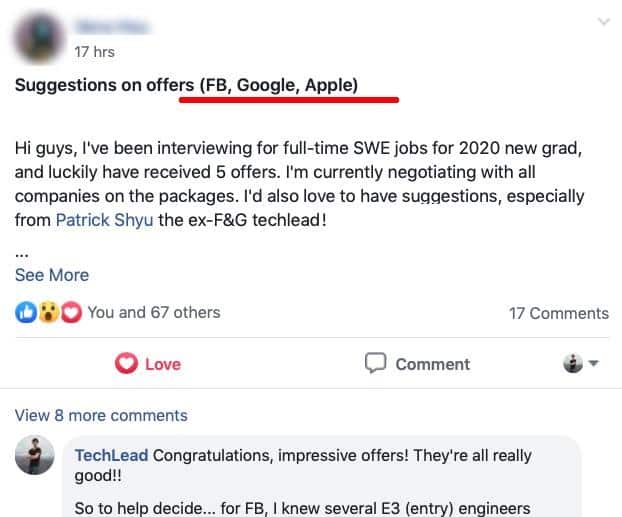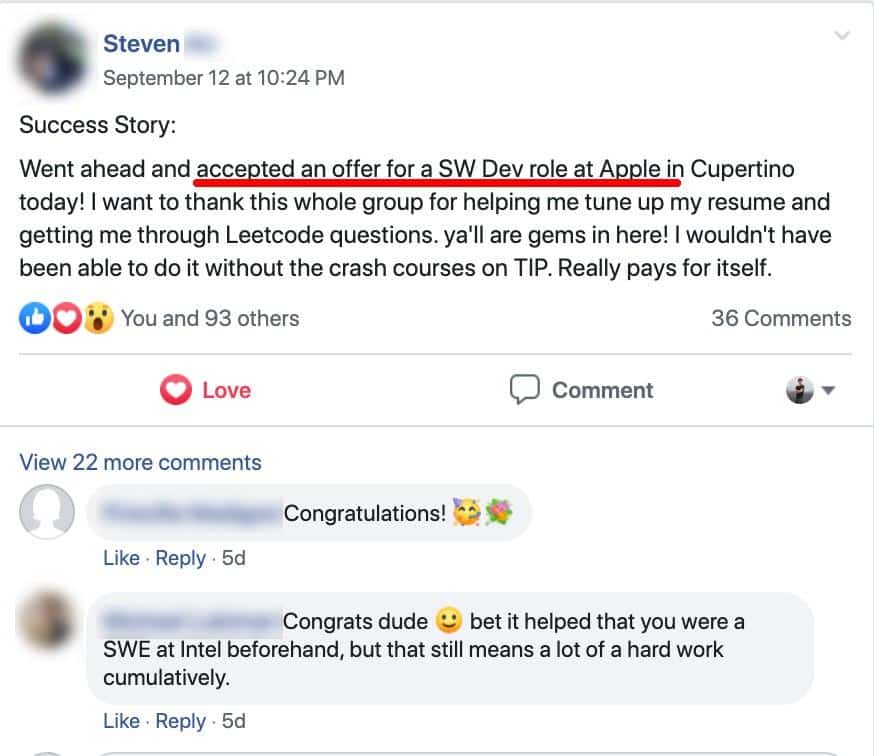Amazon's technical questions can be pretty tough on their own, but you also need to be aware of Amazon's behavioural interview questions in order to perform well in the interview. In this post, we showcase 50 of the most common behavioural questions you can expect to see in your interview with Amazon and give you some tips on how to excel.
I strongly recommend Tech Interview Pro if you're looking for a proven program that's landed thousands of engineers six-figure jobs at Facebook, Google, Amazon, and Apple, I strongly recommend Tech Interview Pro. With a money-back guarantee and thousands of student success stories, I can't recommend Tech Interview Pro highly enough.
GET TECH INTERVIEW PRO FOR $400 OFF
Offer ends April 17, 2025.Picture this: you're a software engineer and you've been studying diligently, making sure your coding skills are nothing but the sharpest you have to offer so that you can ace Amazon‘s interviewing process.
You get to your interview, feeling confident in your abilities and feeling like you can tackle any question you're asked.
But then, you notice that the first question you're asked has nothing to do with coding at all. In fact, it's more about yourself.
Panic settles in. You hadn't prepared for a question like this one before.
This is what happens to most software engineers who want to work for Amazon: they rarely prepare for the behavioural interview in favor of having more time to practice their coding, and it usually doesn't go well.
We already have a post on technical questions from Amazon, but in this post, we're going to focus completely on their behavioural interview questions.
Here are 50 of the most common behavioural questions you could be asked in your interview with Amazon.
Amazon Behavioural Questions
- Why Amazon?
- Tell me about yourself.
- Tell me about a time you had to help a team member struggling with a task.
- Have you ever failed at something? What did you learn from it?
- Have you ever been in a situation where you had to choose among a few options but did not have a lot of time to explore each option?
- Has there been a time when your teammate didn't agree with you? What did you do?
- Give me an example of a time when you showed initiative.
- If a supervisor asked you to do something unsafe that went against a policy, what would you do?
- Give me an example of when you received criticism. How did you respond to the information?
- Describe the biggest failure of your professional career.
- Describe a situation when you faced a particularly demanding problem or challenge in your personal life. How did that affect you in your job?
- Describe a situation when you did not agree with an opinion (or decision) of your superior or supervisor and knew that they were wrong.
- Tell us about a time when you had to deal with an angry or upset client.
- Describe a situation when you went above and beyond with your service (for the customer, for the colleague).
- Describe a time when you sacrificed short-term goals for long-term success.
- Tell me about a time when you took a calculated risk.
- What’s the most innovative idea that you have implemented?
- Tell us about a time when you faced a problem that had multiple possible solutions.
- Describe a situation when you had to deal with ambiguity.
- Tell me about the last time you had to apologize to someone.
- Tell us about a time when you missed a deadline or productivity target?
- Describe a situation when you had to comply with a policy or procedure that you did not agree with.
- If you are given two conflicting priorities from two separate managers, how do you figure out how to proceed?
- Tell me about a time when you delegated a project effectively.
- Tell me about a time you had to work hard to please a client.
- Talk about a time when you experienced a conflict of your personal and professional interests.
- Describe a time when you struggled to communicate something to your boss, colleague, or customer. How did you manage to get your message over?
- Tell us about a situation when you were unable to solve the problem on your own.
- Describe a crisis of motivation you faced. How did you overcome it?
- Describe a situation when you reached a goal and tell us how you achieved it.
- Describe a situation when you were under pressure at work.
- We all make mistakes we wish we could take back. Tell me about a time you wish you’d handled a situation differently with a colleague.
- Tell me about a time you needed to get information from someone who wasn’t very responsive. What did you do?
- Describe a time when it was especially important to make a good impression on a client. How did you go about doing so?
- Describe a time when your team or company was undergoing some change. How did that impact you, and how did you adapt?
- Tell me about a time you had to be very strategic to meet all your top priorities.
- Give me an example of a time when you were able to successfully persuade someone to see things your way at work.
- Tell me about your proudest professional accomplishment.
- Describe a time when you struggled to build a relationship with someone important. How did you eventually overcome that?
- Give me an example of a time when you did not meet a client’s expectations. What happened, and how did you attempt to rectify the situation?
- Tell me about the first job you’ve ever had. What did you do to learn the ropes?
- Sometimes it’s just not possible to get everything on your to-do list done. Tell me about a time your responsibilities got a little overwhelming. What did you do?
- Describe a time when you were the resident technical expert. What did you do to make sure everyone was able to understand you?
- Describe a time when you saw some problem and took the initiative to correct it rather than waiting for someone else to do it.
- Talk about a time when you had to work closely with someone whose personality was very different from yours.
- Which of Amazon's leadership principles do you relate to the most?
- Give me an example of a time when you had to think on your feet to delicately extricate yourself from a difficult or awkward situation.
- Tell me about a time you set a goal for yourself. How did you go about ensuring that you would meet your objective?
- Tell me about a successful presentation you gave and why you think it was a hit.
- Give me an example of a time when you had to explain something fairly complex to a frustrated client. How did you handle this delicate situation?
How To Get A FAANG Job (The Easy Way)
Click below to claim your $400 discount on Tech Interview Pro today. Offer ends April 17, 2025.
CLAIM MY $400 SAVINGS
Offer ends April 17, 2025.Amazon Behavioural Answer Examples
Behavioural Sample Answer #1: Why Amazon?
This is perhaps the most common question that recruiters ask, and its purpose is to find out what excites you about working with Amazon.
To answer this question, make sure you don’t make the answer solely about yourself (mentioning the salary in any way, shape, or form, for example). Instead, you can talk about your favourite Amazon software and what you like best about their work culture.
Behavioural Sample Answer #2: Tell me about yourself
The simplest way to answer this question would be to divide your answer into three parts: present, past, and future.
Talk briefly about your current role, its scope, and perhaps a big recent accomplishment. Then, tell the interviewer how you got there and mention previous experience that’s relevant to the role you're applying for, and lastly, talk about what you’re looking to do next and why you’re interested in this job (and why you're a great fit for it).
Behavioural Sample Answer #3: Describe a crisis of motivation you faced. How did you overcome it?
Different people are motivated by different things. However, candidates don't usually think about motivation, let alone how to motivate themselves, so the way this question is phrased can catch a candidate off guard.
To answer this question, give examples of times when you motivated yourself to reach a higher level of performance. This can be in times of adversity, but it doesn’t need to have that framing.
You can simply give away that you motivate yourself daily to get work accomplished and deliverables completed. Unless you don't have any work examples, avoid personal examples.
Behavioural Sample Answer #4: Tell me about a time when you made sure a customer was pleased with your service
With this question, the interviewer wants to make sure that your definition of excellent customer service exceeds minimal expectations.
To answer this question, you can talk about a time where you calmed an upset customer or went above the expectations of your role to make a customer want to return.
You can also talk about a time where you had a customer dispute and were able to smooth over the issue using your instincts and friendly disposition.
Behavioural Sample Answer #5: Describe a situation when you were under pressure at work.
Sadly, stress-free working environments are slowly ceasing to exist in this day and age: companies set targets for their employers, and these targets are often hard to achieve, which often creates a lot of pressure on most people in the office.
To answer this question, try to tell a story: why you experienced pressure, how you dealt with it, what you learned along the way. The more details you use in your answer, the more credible it will sound.
What Should I Use To Prepare For My Behavioural Interview?
Once you become aware of the importance of properly answering behavioural questions, it's simply impossible to focus on coding alone.
But there's a problem: this is simply adding another topic to the list of things that you have to prepare for, and not every interview prep resource around covers both at the same time.
And if they do, they usually cost nearly as much as getting an actual CS degree.
If this is the case, what do you use to study, then?
I recommend you use Tech Interview Pro, an interview prep program designed by a former Google and Facebook software engineer who has compressed the knowledge he gathered from conducting over 100 interviews during his time into a single course.
And here are a few reasons why I recommend it.
#1 A Comprehensive Approach
Tech Interview Pro takes a thorough approach to its teaching, considering both the technical and behavioural aspects in its 20+ hours of video lessons.
Here’s TIP’s course outline, with the behavioural topics bolded:
- Understanding The Interview Process
- Four Axes of the Interview
- Coding
- Data Structures & Algorithms
- Systems Design
- Communication
- Interviewing Masterclass
- Data Structures & Algorithms
- 100+ Coding Sessions
- The Mock Interview
- Systems Design
- Transitioning Careers
- Negotiating & Accepting Your Offer
As you can see, TIP has a balance of both the technical and the behavioural, which is more coverage than most of the tech interview prep courses out there.
#2 Private Facebook Group
Another neat feature that Tech Interview Pro grants its students is access to a private Facebook group with 1,500+ former students of the course.
Here are some of their success stories:



When you consider how many TIP students have landed jobs at FAANG companies thanks to the course, as well as how active and supportive the Facebook group is on a day-to-day basis, you realize that it’s an invaluable resource to have.
#3 Created By An Industry Insider
Tech Interview Pro is run by an industry veteran who has reverse-engineered the hiring process to give you the best chance of success.
TechLead (Patrick Shyu) has grown his websites to millions of users, spent his recent years working at Facebook and Google, and has conducted over 100 technical interviews for Google.
So if there’s anyone who can teach you how to ace your technical interviews, it’s this guy.
#4 Bi-Weekly Q&A Sessions
Every two weeks, TIP students can engage in Q&A sessions with the course’s founder, TechLead.

This is a huge advantage: after all, nothing’s stopping you from asking any of the questions featured on the list above, whether it’s a technical question or a behavioural one, and you can expect a thorough answer in return.
Another thing to keep in mind is that every Q&A session is recorded and ready to be accessed at any time, so nothing is stopping you from checking previous Q&A sessions too.
#5 Resume Reviews
Your resume will be the first thing a recruiter will see coming from your end, and making it look pretty won’t be enough: you need to make sure it knocks them out when they see it so that you can have a headstart into the interviewing process.
Considering this, TechLead will also personally review your resume and help you tailor it for the position and the company you seek to apply for.
#6 Lifetime Access
Lastly, TIP grants lifetime access to the entire course and private Facebook group, which means that you’ll be able to see new video lessons as they’re added, grow alongside the Facebook group, watch all of future Q&A sessions, and everything else.
TIP’s got your back, whether you want to land a job now or in the future.
Amazon Behavioural Interview Questions: In Summary
Behavioural questions can be lethal if you only focus on your coding skills, and this applies to any tech company out there, not just Amazon. Having a solid set of soft skills should definitely be part of your job description if you want to succeed, though gaining those soft skills isn't always the easiest process even for the best developers.
I strongly recommend Tech Interview Pro if you're looking for a proven program that's landed thousands of engineers six-figure jobs at Facebook, Google, Amazon, and Apple, I strongly recommend Tech Interview Pro. With a money-back guarantee and thousands of student success stories, I can't recommend Tech Interview Pro highly enough.


